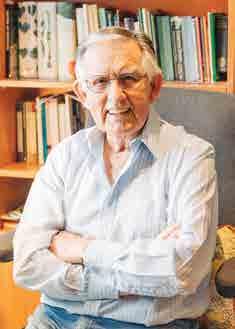
2 minute read
Cooking with Lee
Irish Stew
For more recipes, check out Lee on Instagram @lee.behan LEE BEHAN
Advertisement
INGREDIENTS
900g boneless lamb neck, trimmed and diced 1 litre chicken stock 50g pearl barley, washed 225g potatoes, cut into chunks 225g carrots, thickly sliced 225g leeks, well-trimmed and thickly sliced 225g baby pearl onions or small shallots, peeled 2 fresh thyme sprigs Sea salt and freshly ground black pepper Chopped fresh parsley, to garnish Serve with colcannon mash
METHOD
1. Place the lamb in a large, heavy-based pan and pour over the stock.
Bring to the boil, then skim off any scum from the surface and stir in the barley. Reduce the heat and simmer for 50 minutes, until slightly reduced and the lamb is almost tender. 2. Add the potatoes to the lamb with the carrots, leeks, baby pearl onions and thyme and simmer for 30 minutes, or until the lamb and vegetables are completely tender but still holding their shape.
Season to taste. 3. To serve, transfer the stew into a warmed casserole dish and scatter over the parsley. Have a dish of colcannon alongside and allow everyone to help themselves.
BOOK REVIEWS
CONTINUED FROM PAGE 80
in Canada resulted in the death of a young man. Walker left for ‘down under’ and rebuilt his life in New South Wales. He even entered politics, but his hatreds could have deadly results. When intoxicated he shot and wounded a clergyman who, sadly, made the mistake of forgiving the man in court. Walker was thus spared a gaol sentence. He arrived in WA during the late 1890s and, after his destructive career in journalism, attained the status of a lawyer and ‘progressive’ politician. He was famous for vindictive political rhetoric both in and outside parliament and on the bench. However, as author Peter Burke noted, when in high office himself the ‘outspoken’ Walker was “thin-skinned, litigious and abjectly hypocritical with regards to press freedom”. One might as well add that Mr Burke reveals the man was completely estranged from his family. Walker was directly responsible for the lies and innuendos which helped to destroy O’Connor. Author Burke is both frank and fair in raising awkward issues about Mr Walker. He asks (pp301-302) some searching questions. When will writers (eg., historians) “tell us more about his ‘varied activities’ on four continents, and about the impact on so many people of his ‘dangerous gift’ for broadcasting invective at random”.










